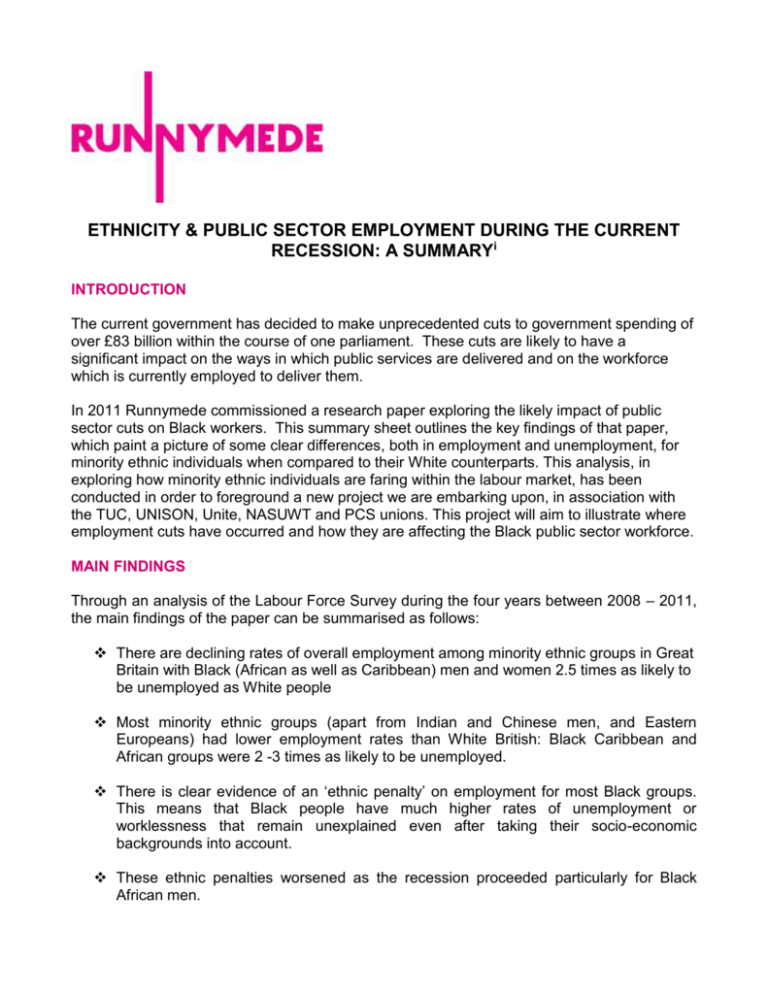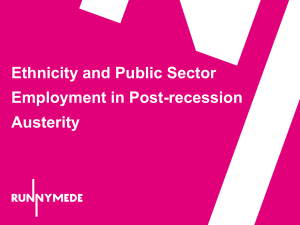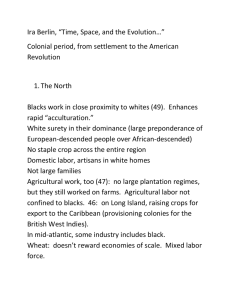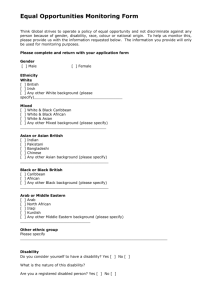ETHNICITY & PUBLIC SECTOR EMPLOYMENT DURING THE
advertisement

ETHNICITY & PUBLIC SECTOR EMPLOYMENT DURING THE CURRENT RECESSION: A SUMMARYi INTRODUCTION The current government has decided to make unprecedented cuts to government spending of over £83 billion within the course of one parliament. These cuts are likely to have a significant impact on the ways in which public services are delivered and on the workforce which is currently employed to deliver them. In 2011 Runnymede commissioned a research paper exploring the likely impact of public sector cuts on Black workers. This summary sheet outlines the key findings of that paper, which paint a picture of some clear differences, both in employment and unemployment, for minority ethnic individuals when compared to their White counterparts. This analysis, in exploring how minority ethnic individuals are faring within the labour market, has been conducted in order to foreground a new project we are embarking upon, in association with the TUC, UNISON, Unite, NASUWT and PCS unions. This project will aim to illustrate where employment cuts have occurred and how they are affecting the Black public sector workforce. MAIN FINDINGS Through an analysis of the Labour Force Survey during the four years between 2008 – 2011, the main findings of the paper can be summarised as follows: There are declining rates of overall employment among minority ethnic groups in Great Britain with Black (African as well as Caribbean) men and women 2.5 times as likely to be unemployed as White people Most minority ethnic groups (apart from Indian and Chinese men, and Eastern Europeans) had lower employment rates than White British: Black Caribbean and African groups were 2 -3 times as likely to be unemployed. There is clear evidence of an ‘ethnic penalty’ on employment for most Black groups. This means that Black people have much higher rates of unemployment or worklessness that remain unexplained even after taking their socio-economic backgrounds into account. These ethnic penalties worsened as the recession proceeded particularly for Black African men. Some minority ethnic females experience high rates of economic inactivity - 66% of Pakistani/Bangladeshi women are economically inactive compared to 31% of Black African and 25% of White British women. The highest rates for unemployment among women are found among those of Black African heritage 50 40 30 20 Percent 60 70 80 Figure 1 – Ethnic Group Employment by year by sex – Women 2008 2009 2010 2011 Year W British B Caribbean Pakistani/Bangladeshi W Irish B African Chinese E European Indian Other Source: Labour Force Survey (2008 – 2011) Black African and Black Caribbean people in particular rely heavily on public-sector employment, therefore government public sector cuts will have a negative impact on their livelihoods Women generally are more likely to be employed within the public sector White Irish, Black Caribbean and Black African groups were most likely to be found working in the public sector. 30% of all Black Caribbean women are public sector workers compared to 26% of all White British women. However, even the Black African and Black Caribbean workers in professional/managerial positions were badly paid. Black workers in the public sector also experience differences compared to White workers in the hourly pay they receive, their access to professional & managerial positions and overall employment. 60 70 Percent 80 90 Figure 2 – Ethnic Group Employment by year by sex – Men 2008 2009 2010 2011 Year W British B Caribbean Pakistani/Bangladeshi W Irish B African Chinese E European Indian Other Source: Labour Force Survey Given that Black African men, together with Chinese and Indian men, tend to have the highest levels of education, it is telling that their rate of unemployment is 12% compared to a 6% rate for White British men. They are also the most likely out of all men to be employed in the public sector – 17% of them are public sector workers compared to only 7% of Pakistani and Bangladeshi men. 2nd generation immigrants born and educated in Britain have similar unemployment rates to their first generation counterparts Black unemployment has been found to be particularly high in times of economic recession in the UK such as during the mid 1980s and early 1990s When unemployment rises during periods of recession, it begins earlier among Black groups and at its highest point, during the 4 years between 2008 and 2011, Black unemployment was 3 times higher than that for the rest of the population When the economic situation begins to improve, it takes longer for the impact to be felt among Black groups, as unemployment remains higher for them for a longer period of time CONCLUSION In total then, as some of the most disadvantaged groups are more likely to work within the public sector, the full impact of the government’s austerity policies in this area will surely make the employment situation of these groups much worse, with serious social implications. With the support of the TUC, UNISON, Unite, NASUWT and PCS, Runnymede will use a new project to achieve a number of aims - to assess the impact of the cuts on the profile of the public sector workforce; to connect organisations working to promote equality during this difficult period and to provide up to date monitoring data to inform employers and government about the impact of their choices. As part of this work we will be surveying public sector workers via their union branch representatives in order to assess how employment situations may have changed or are due to. We have also produced an Online Guide In this Together? Counting the equality costs of public service reform – an online guide to monitoring where you work. This Guide provides advice and tools to support union members who want to collect monitoring information that will help them to ensure their employers assess the equality impact of potential decisions before those decisions are made. These tools, survey and a final report available in Autumn 2012 will help us to assess the full impact of public sector cuts and enable us to hold both employers and government to account under their equality legislation responsibilities. This summary is taken from a longer paper “Ethnicity and public sector employment during the current recession” commissioned by Runnymede and written by Professor Yaojun Li, University of Manchester i






